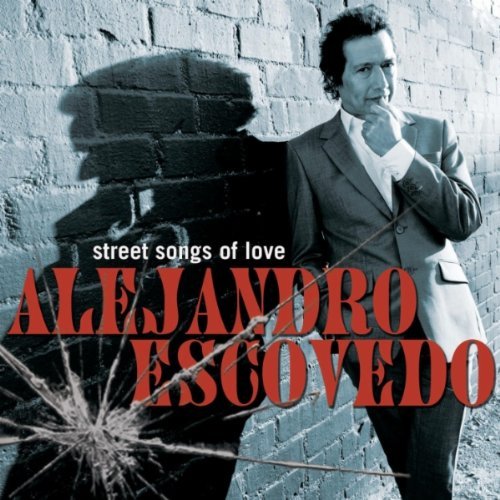
It take a few listens to fully digest Alejandro Escovedo’s Street Songs of Love. Every song is an epic arena rock affair about love and faith. The production is incredibly slick, thanks to Tony Visconti, who worked with T. Rex, David Bowie, and U2. So is it possible for an over-polished album about love to be a good one? Maybe, if you meet it on its own sentimental wavelength.
Really, the title says it all. The alt-country hero is writing love songs at street level – working class love songs and everyman love songs. It’s a theme that’s bound for schmaltz – “I’m in love with love,” “I’m a fool for your love,” “You gotta have faith in the one that you love,” etc. The word “love” is all over this thing. So to say, “Eggghh, I hate how sentimental this album is,” is to discredit the very foundation that it’s built on.
In many ways, Street Songs is analogous to The Rising by Bruce Springsteen – an album with a sentimental arc and one where the songs seemed to make a lot more sense in an arena. Was it a great album to sit down and listen to on headphones by yourself? Not really. Is it a great album to hear while singing along in an arena full of post-9/11 Americans? Hell yeah.
It’s the same deal with Escovedo’s album opener, “Anchor”, which has that Springsteen/Hold Steady drive that would sound great over a giant PA system while Escovedo plays up the song’s sentimental catharsis to the audience. There are big harmonies, patriotic guitar solos… it begs for the arena treatment. So sure, it’s easy to be cynical about a line like, “If your love was a ship,/ I’d pull your anchor and I’d christen it.” But in order to really meet Escovedo halfway, you’ve got to get in touch with the sentimental person at your core. Come to terms with this album’s love-iness, and this song is an absolute killer.
That said, “Anchor” is the “city on a hill” example of what Street Songs of Love is capable of. On the other end of the spectrum, there’s “Street Songs”, which takes a weird faux street beat and has Escovedo talking about a rodeo girl “wearing Blackmail and she was smoking pot” and “singing street songs of love.” Aside from some excellent handclaps, this song is just odd. What’s with the bloopy ’80s R&B synth bass?
One of the big sells for Street Songs is that it includes two of Escovedo’s friends, who happen to be rock ‘n’ roll titans: Ian Hunter of Mott the Hoople and Bruce Springsteen. Hunter provides his well-aged “rock via bluesman” voice on one of the album’s nicer understated ballads, “Down In The Bowery”. Springsteen shows up on a real shredder, “Faith”, and he really gets to growl out a vocal (which, predictable as it is, is awesome).
But really, every song on this album teeters on the edge of “great rock tune” and “overwrought and overproduced love song.” Actually, forget that every song is about love for two seconds – it’s the arrangements that are always iffy. The songs that really play up those E Street Band-style guitars and harmonies (“Anchor” and “Undesired”) come off much better, whereas the songs that feel overcrowded with vocalists and unnecessary percussion (“Tula”) tend to fall flat.
The final song is “Fort Worth Blue”, which is a gorgeous Southwestern instrumental – an electric guitar and an acoustic guitar intermingling in a soft ballad with light percussion in the distance. This is where the album title earns its credibility, because this is the song where you want to hold someone’s hand as the sun goes down behind a cityscape. There’s nobody else’s words to get in the way or project on what you feel. It’s like Escovedo is challenging you to write your own story of love or heartbreak. And for an album that starts out with a song that belts love from the rooftops, it’s a surprisingly perfect finish.
